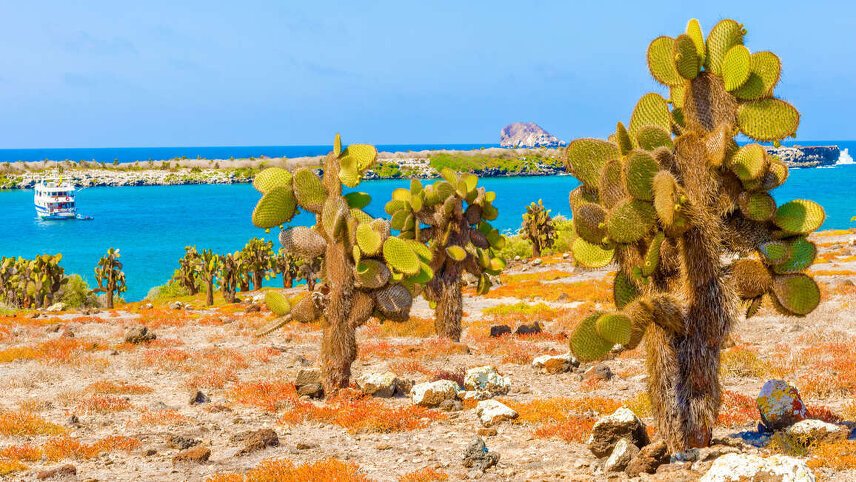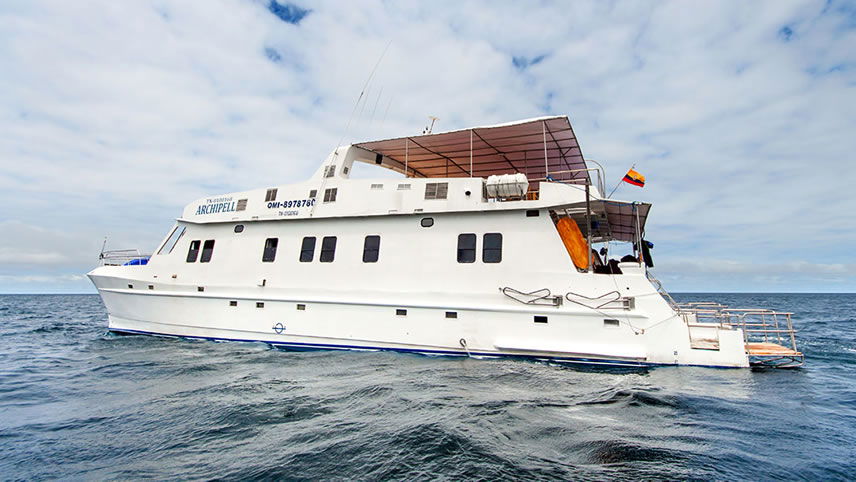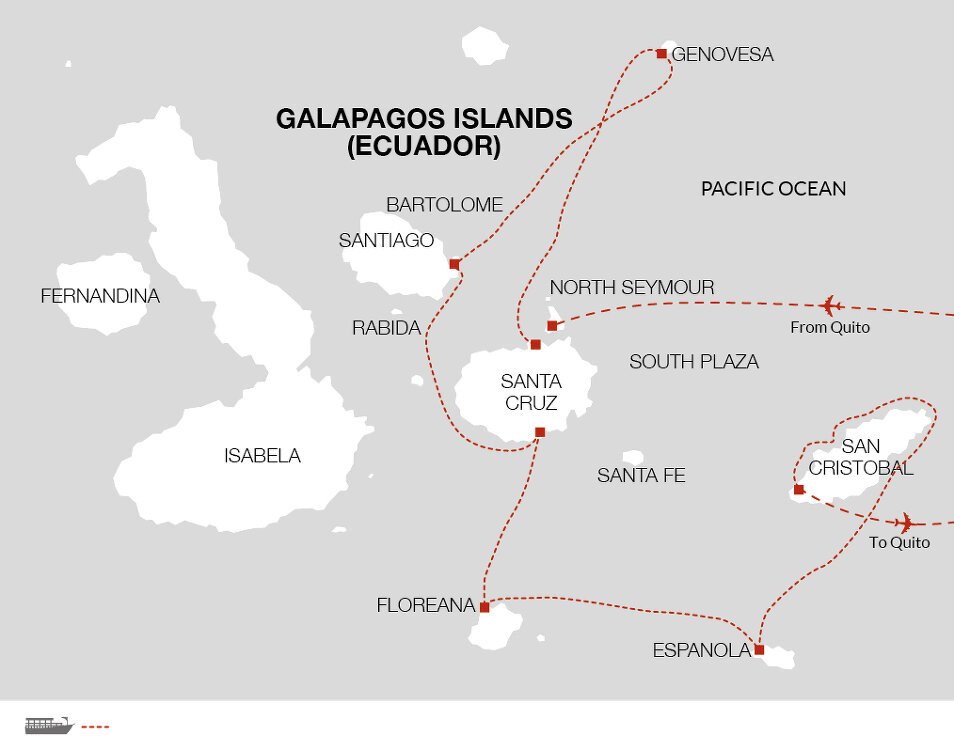
Overview
Itinerary
Arrive in Puembo, a quiet rural neighbourhood of Quito located around 20 minutes from the airport and 45 minutes from the downtown city centre.
Ecuador's mountain capital is, at 2,850m, the second highest capital in Latin America, lying in a narrow valley at the foot of the Pichincha Volcano. Arriving into the city by plane is quite spectacular as you approach over snow-capped mountains and extinct volcanoes - a window seat is recommended! You will be met on arrival at Mariscal Sucre International Airport (UIO) by a driver to take you to this evening's hotel, where more information will be given to you about tomorrow's schedule.
The hotel is a tranquil, colonial-style property with a large garden and swimming pool. It's located in the countryside suburbs of Quito, near the airport; perfect for an early start tomorrow. The hotel can help organise a taxi for you into downtown Quito if you arrive early in the day and wish to visit the city. Stay: Hotel Rincon de Puembo (Comfortable)
Today we transfer to the airport early for our flight to the Galapagos Islands via Guayaquil (refueling stop only, you will not disembark the plane).
Lying on the Equator, 970km west of the Ecuadorean coast, the Galapagos National Park is a unique collection of islands, formed by volcanoes over hundreds of thousands of years and consisting of six main islands, 12 smaller islands, and over 40 small islets, each one supporting a distinct and unique flora and fauna, including prehistoric creatures found nowhere else on earth. This desolate and fantastic habitat was discovered in 1535 by Fray Tomas de Berlanga. Charles Darwin visited the islands on the Beagle exactly three hundred years later, in 1835. He observed the total isolation of the giant reptiles and other creatures, and this played a substantial part in his theory of evolution.
Of the extraordinary animals to be found in the Galapagos many are reptiles, such as the great tortoise, large land iguanas, numerous lizards and three species of non-poisonous snakes. There are also several species of turtle, which come ashore to mate. Up to three quarters of a million seabirds flock to the islands, including a third of the world's blue-footed boobies, frigatebirds, pelicans, cormorants, albatross and petrels. Only 35cm tall, the Galapagos penguin can be seen swimming among tropical mangroves, whilst offshore it is common to see dolphins, sea lions and fur seals playing in the water. Fearless though not tame, the extraordinary wildlife is often inquisitive and the opportunities for photography are superb.
The Galapagos National Park charges a visitor fee of $100 USD (subject to change), payable in cash on arrival, which funds park maintenance and supervision in the Galapagos, as well as ecological study, conservation and infrastructure development in Ecuador's other national parks. Entry fees and the funds they generate for the national park system are among measures taken by the Ecuadorian government to protect its natural heritage.
At Baltra Airport, a guide will meet us to help us collect our luggage and accompany us to our stylish vessel - the Archipel I. We'll visit Bachas Beach this afternoon, a beautiful bay with soft, white coral sand that is frequently visited by sea turtles to lay their eggs. After enjoying some leisure time at the beach, we can explore a small lagoon hidden behind some bushes, where occasionally it is possible to observe flamingos, black-necked stilts and whimbrels. You might also observe some rusty barges, which were abandoned here after WWII when the USA rented this island as a strategic point to protect the Panama Channel from Japan. Stay: Archipel I (Comfortable) (B/L/D)
The northernmost island in the archipelago, Genovesa is a wild and windswept volcanically-formed caldera. Before our landing, we'll take a dinghy ride along the eastern arm of the caldera, where the soaring 25 metre-high walls are quite overwhelming. We may spot a Galapagos fur seal or a seabird resting on one of the ledges at the base. The landing point at the steep Prince Philip's Steps see us hiking up the steep stairs from the landing dock to a bush of palo santo shrubs on top. Red-footed boobies use these scarce nesting places so that they don't have to nest on the rocky ground. Upon arriving at the edge of the rim, the bushes open up and we can enjoy panoramic views, a strong sea breeze and the amazing flying skills of countless seabirds.
While here at Genovesa, we'll also visit Darwin Bay and marvel at the sheer number of birds along the many trails - nesting frigatebirds, gulls, and boobies are just a few of the species we may spot. Be sure to bring your camera to take some snaps of our new feathered friends. Stay: Archipel I (Comfortable) (B/L/D)
We'll see the dramatic volcanic features of Bartolome today, hiking to Bartolome's summit for a stronger perspective of the islands' not-too-distant volcanic origins and enjoying panoramic views - it's one of the best among the islands. The other Galapagos Islands are visible in the distance, as well as Pinnacle Rock, the island's famous towering landmark. We'll take the opportunity to swim and snorkel along the shore, home to one of the most iconic volcanic rock formations on the islands. Home to Galapagos penguins, friendly sea lions, sea turtles and a huge variety of fish, Bartolome and its surrounding waters are a fantastic place to explore the natural wonders of the Galapagos.
We continue to Sullivan Bay on Santiago Island this afternoon, where the arrival is like a moon landing. The desolate, sprawling lava fields seem to be mostly lifeless, but this island, which is particularly popular among photographers, is deceptive, with creatures proliferating even here. Green sea turtles burrow in the white-sand beaches, where you can also find sally lightfoot crabs, blue herons and oystercatchers. Stay: Archipel I (Comfortable) (B/L/D)
In the morning we arrive in Puerto Ayora, on Santa Cruz Island. Santa Cruz is the second largest island in the Galapagos and has the largest population, with Puerto Ayora as its main town. It also boasts the most varied of the islands' vegetation zones: coastal, transition, scalesia, miconia and pampa. The native scalesia forest of El Chato Tortoise Reserve is the best place to search for Galapagos giant tortoises in their most authentic setting. Though it can be quite moist and muddy, the visit will be an adventure, trying to spot the giant creatures silently leave their favourite ponds. While on the mainland, we'll also visit the Twin Craters - found on either side of the road leading to Puerto Ayora. These impressive formations were formed by magma domes, which hardened on the outside while the lava continued flowing inside, leaving huge and empty magma chambers that eventually collapsed into two large holes. The craters lie within a lush scalesia cloud forest, a high-altitude plant species that is endemic to the Galapagos. This area is also home to the carpenter finch, which uses tools to search for food.
This afternoon we visit the Fausto Llerena Breeding Centre, where we can observe tortoises that come from various islands of the archipelago - at Fausto Llerena they are breeding tortoises only to repopulate areas where their populations have been affected by non-native wildlife (predominantly feral dogs). One of the main attractions here is the embalmed Lonesome George - estimated to have died at between 93 and 109 years of age, Lonesome George is recognised as the last of its kind, and as a symbol of the efforts invested into conserving endangered species. Stay: Archipel I (Comfortable) (B/L/D)
The peninsula of Cormorant Point forms the extreme north cape of Floreana, and at the landing beach we will be welcomed by a small Galapagos sea lion colony. Spot schools of stingrays hiding in the sandy bottom of the beach and, during the first months of the year, witness Pacific Green turtles coming ashore to bury their eggs. From Cormorant Point we head to the snorkelling spot at Devil's Crown, a coral reef surrounded by an eroded volcanic crater and the perfect home for marine life. Look out for small sharks, rays and schools of tropical fish. You may even spot Galapagos penguins here - this spot is the only place in the south-eastern archipelago where the Galapagos penguin resides.
Later in the afternoon, we stop at Post Office Bay. A barrel was placed here in the late 18th century by English whaling vessels to be used as a post office. Passing ships would stop to leave mail for loved ones, collecting at the same time any mail destined for ports on their itineraries. Today the box is used mainly by tourists, and you can drop off your own postcard, picking up an unstamped letter to post for someone else. You can also climb the small basalt cone at the Baroness Lookout for panoramic views of the coastline. This viewpoint was the famous spot of one of Floreana's first settlers, the eccentric baroness and self-proclaimed 'Empress of the Galapagos' Eloisa von Wagner. Stay: Archipel I (Comfortable) (B/L/D)
Today we spend some time exploring Espanola Island, the southernmost island in the Galapagos archipelago and home to several wildlife species, including masked and blue footed boobies. We'll sail into Gardner Bay, an excellent swimming and snorkeling site. Strap on your snorkel and if conditions allow, see an abundance of sea life including; young sea lions and large schools of surprisingly big tropical fish, including yellow-tailed surgeonfish, king angelfish, and bump-head parrot fish.
In the afternoon, we head to Punta Suarez, where a hike to the top of the cliff makes for spectacular photo opportunities. This rugged point on the western side of Espanola Island is spectacular: gargantuan waves break on jagged cliffs and large bird colonies thickly populate the interior of the island; there is a distinct feel of desolate wilderness here. The waved albatross is seen here from April to December during its mating/nesting season. This bird leaves land between January and March each year to make its annual odyssey far out to sea. Amazingly, Espanola is the nesting site of virtually the entire world population of this species, with more than 12,000 pairs residing here. Large numbers of masked and blue footed boobies are also found here, red-billed tropicbirds dash madly through the air, and both marine iguanas and sea lions are common. A huge blowhole at Suarez Point, where the surf is forced through a natural rock formation spouting seawater 15 to 20m into the air, adds to the island's impression of untamed beauty. We follow the trail through a rookery and learn the geological history of the island from our naturalist guide, including its dramatic volcanic features, climate, flora and fauna. Stay: Archipel I (Comfortable) (B/L/D)
The wind-sculptured volcanic cliffs at Pitt Point make up the extreme eastern end of San Cristobal, and therefore of the whole archipelago. These cliffs were the first sight of land when HMS Beagle and Charles Darwin arrived on the 15th September, 1835. On the small green sand beach, we'll be welcomed by a group of barking Galapagos sea lions. This is a bachelor colony, where males usually relax and prepare themselves for fighting and mating. In the afternoon, we land at Witch Hill, where the primary attraction is snorkelling off the coral-sand beach. This was one of the first sites visited by Charles Darwin in this inaugural expedition, and has an impressive landscape, where we may see pelicans, blue-footed boobies and swallow-tailed gulls, as well as marine iguanas. Stay: Archipel I (Comfortable) (B/L/D)
The tiny island of Lobos has some wonderful wildlife encounters to experience. On foot, view the sea and shore birds nesting and feeding. Spot a small colony of blue-footed boobies, or nesting frigatebirds, who mate here with clumsy dances - heaving their striking blue feet or blowing up their balloon-sized scarlet pouches - as well as finding a large colony of sea lions. lions. Be sure to bring your camera to catch some snaps at this prime wildlife watching haven.
We'll then travel to San Cristobal Airport, from where we fly back to Quito and transfer to our hotel. Stay: Hotel Rincon de Puembo (Comfortable) (B)
The trip ends after breakfast at our hotel in Puembo, Quito.
There are no activities planned today, so you are free to depart at any time. Pick-up times for your airport transfer to Mariscal Sucre International Airport (UIO) will be re-confirmed locally. If your flight is departing later in the day, luggage storage facilities are available at the hotel. If you would like to book additional nights in Quito at the end of your stay, these can be arranged either at the hotel in Puembo, or in a hotel in downtown Quito.
We recommend spending extra time in Quito, or adding to your nature-based holiday by booking our four-night Amazon extension package (trip code: AE). (B)
Trip Inclusions
- Travel with a naturalist guide, spotting iconic wildlife from the comfort of a catamaran
- Snorkel and walk to find sea lions, magnificent frigatebirds, blue-footed boobies, white-tip reef sharks and much more
- Look for the waved albatross and the red-footed booby at the birding islands of Espanola and Genovesa
- Moderate pace tours are ideal if you want a holiday which combines exciting activities and experiences with plenty of time to relax and unwind. Typically you'll be active and busy for part of the day but then also have time to rest and recharge your batteries.
- Accommodation, itinerary and inclusions subject to change.
- Price is for land, cruise and internal flights as specified. Flights not specified are not included
Brochure

Explore Small Group Adventures (2024-25)
Availability
A definite departure means minimum numbers have been reached for this departure to operate. Your Global Journeys Travel Advisor will check the availability of your departure date when you enquire. Additional savings may apply. We guarantee the lowest price in Australia. T&C’s apply.
Tour & cruises prices are per person. Prices shown have savings applied, are subject to availability and may be withdrawn at any time without notice. Pricing and trip details are correct at this point in time, however are subject to confirmation at the time of booking and are subject to change by Explore. For cruise itineraries, cabin images are sourced from Explore. These should be treated as indicative only. Cabin inclusions, upholsteries and room layout may differ to the image(s) shown depending on the ship selected and your sailing dates.









